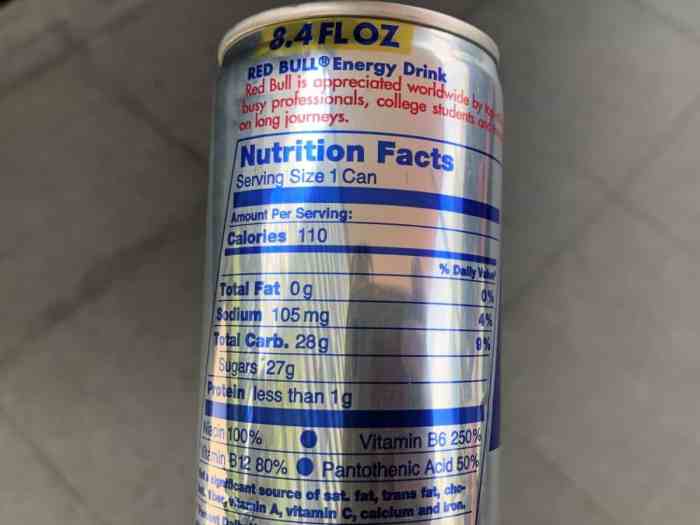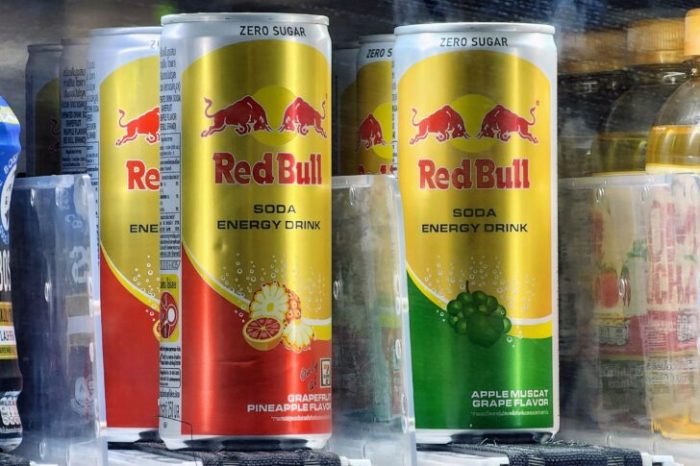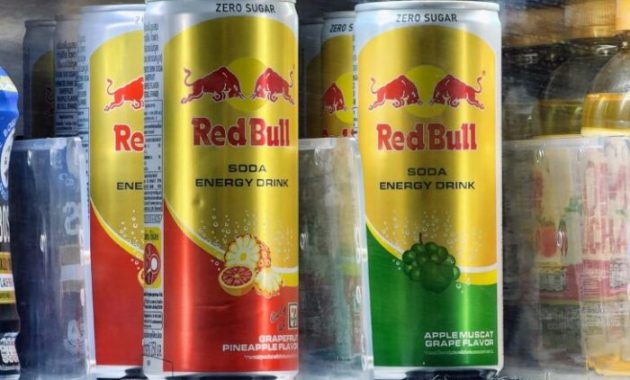Sodium and Red Bull Consumption

Red bull nutrition facts sodium – Red Bull, that ubiquitous energy drink, packs a punch—and not just in terms of caffeine. Its sodium content is a factor often overlooked, yet crucial for understanding its impact on overall health, particularly for individuals with specific health concerns. Understanding the sodium levels in Red Bull and its implications for daily intake is key to responsible consumption.
Recommended Daily Sodium Intake and Red Bull Consumption
The recommended daily allowance of sodium varies depending on age, health status, and other factors. Generally, the American Heart Association recommends a maximum of 2,300 milligrams (mg) of sodium per day, with an ideal limit of 1,500 mg for most adults. A single can of Red Bull typically contains around 20-30 mg of sodium. While this seems insignificant compared to the daily recommendation, regular consumption can contribute significantly over time.
For example, consuming three cans of Red Bull daily adds 60-90 mg to your intake, a number that quickly accumulates. This is especially important for individuals already consuming sodium-rich foods throughout the day.
Potential Consequences of Excessive Red Bull Consumption Related to Sodium Intake
Excessive sodium intake, regardless of source, can contribute to several health problems. High sodium consumption is strongly linked to high blood pressure (hypertension), a major risk factor for heart disease, stroke, and kidney disease. While a single Red Bull won’t cause immediate hypertension, consistent high consumption, combined with a diet already high in sodium, significantly increases the risk. Furthermore, excessive sodium can lead to water retention, bloating, and potentially exacerbate existing conditions like heart failure or kidney disease.
So, you’re checking the Red Bull nutrition facts, specifically the sodium content? That’s a smart move, bro. High sodium isn’t exactly a party in your system. But hey, if you’re looking for a more substantial meal’s nutritional breakdown, maybe check out the nutrition facts Wendy’s offers; it might give you a better idea of sodium levels in a different context.
Then you can compare and contrast, making sure your Red Bull sodium intake doesn’t totally throw off your daily balance.
For individuals with these pre-existing conditions, even the moderate sodium content in Red Bull might warrant careful monitoring and potentially limitation.
Visual Representation of Red Bull Consumption and Daily Sodium Intake
Alternative Energy Drinks and Sodium

So, you’re conscious of your sodium intake, and you’re wondering how Red Bull stacks up against the competition in the energy drink arena. It’s a valid concern, especially considering the high sugar content often associated with these beverages. Let’s dive into a comparison to see how Red Bull’s sodium levels fare against other popular choices.
Understanding the sodium content of energy drinks is crucial for managing your overall health. High sodium intake can contribute to various health problems, including water retention, high blood pressure, and increased risk of cardiovascular diseases. While a single can might not be a major concern, regular consumption warrants a closer look at the nutritional profile.
Sodium, Sugar, and Caffeine Content Comparison, Red bull nutrition facts sodium
The following table compares the sodium, sugar, and caffeine content of several leading energy drinks. Note that these values can vary slightly depending on the specific flavor and serving size. It’s always best to check the nutrition label on the individual can for the most accurate information.
| Energy Drink | Sodium (mg) per serving | Sugar (g) per serving | Caffeine (mg) per serving |
|---|---|---|---|
| Red Bull (8.4 fl oz) | 110 | 27 | 80 |
| Monster Energy (16 fl oz) | 100 | 54 | 160 |
| Rockstar Energy (16 fl oz) | 120 | 54 | 160 |
| Bang Energy (16 fl oz) | 10 | 1g | 300 |
The data above highlights the variability in sodium content across different energy drink brands. While Red Bull sits within the mid-range in terms of sodium, it’s crucial to remember that these are significant amounts of sodium in a single serving, especially when considering regular consumption. The significant differences in sugar and caffeine levels further illustrate the diverse nutritional profiles within the energy drink market.
Red Bull’s Sodium Content Relative to Other Caffeinated Beverages
Comparing Red Bull’s sodium content to other caffeinated beverages like coffee and tea reveals a significant difference. A typical cup of coffee or tea contains minimal sodium, often less than 5mg. This stark contrast underscores the higher sodium load associated with energy drinks like Red Bull.
Nutritional Differences Between Red Bull and Healthier Alternatives
Healthier alternatives to energy drinks, such as water infused with fruit, unsweetened iced tea, or even a small amount of naturally sweetened juice, offer a much lower sodium content and often contain essential vitamins and minerals absent in most energy drinks. These alternatives provide hydration and a natural energy boost without the added sugars, excessive caffeine, and high sodium levels found in Red Bull and similar products.
Choosing these alternatives can significantly contribute to a healthier lifestyle by reducing sodium intake and promoting overall well-being.
Essential Questionnaire: Red Bull Nutrition Facts Sodium
Is Red Bull high in sodium compared to other energy drinks?
It varies. Some energy drinks have more sodium, some less. It’s best to compare nutrition labels directly.
Can I reduce my sodium intake by choosing a different Red Bull flavor?
Sodium content might vary slightly between flavors, but the differences are usually minimal. Check the nutrition facts on each can.
What are the long-term effects of high sodium intake from Red Bull?
Excessive sodium intake over time can contribute to high blood pressure and other health issues. Moderation is key.
Are there any sugar-free Red Bull options with lower sodium?
Check the nutrition facts for sugar-free versions; sodium content might differ from regular Red Bull.

